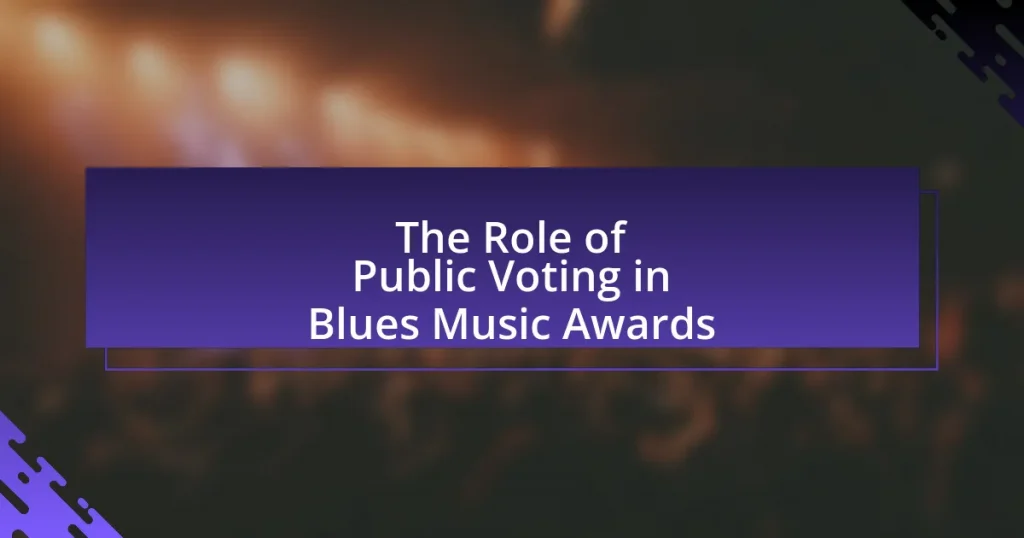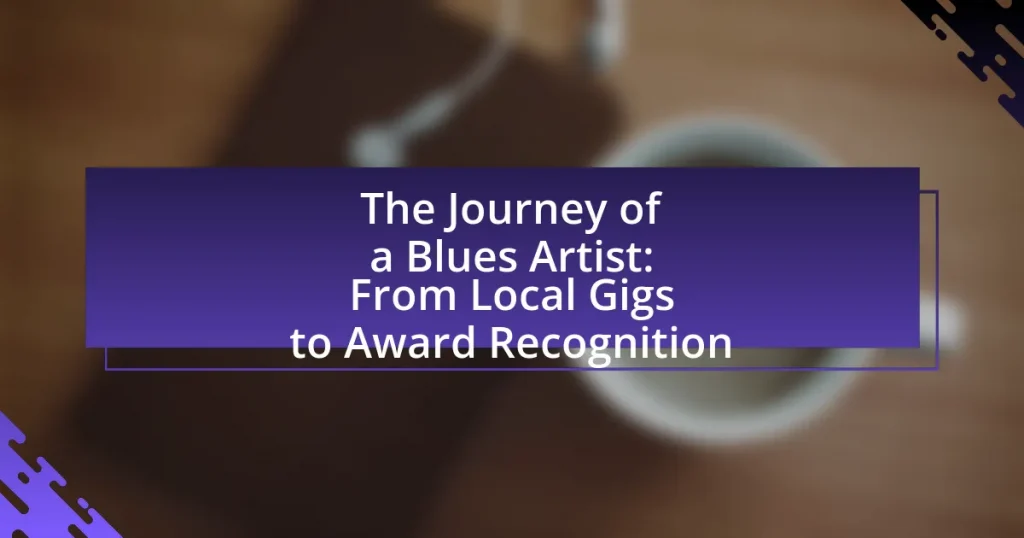The article focuses on iconic blues artists who have won awards, highlighting their significant contributions to the genre, mastery of musical techniques, and influence on future generations. It examines how awards, such as the Grammy and Blues Music Awards, enhance recognition and visibility for these artists, impacting their career trajectories and solidifying their legacies. Key characteristics that define iconic blues artists, including emotional depth and innovative musical styles, are discussed, along with the cultural influences that shape their work. The article also addresses the challenges faced by award-winning artists and offers insights for emerging musicians on gaining recognition in the blues scene.
![]()
What defines iconic blues artists who have won awards?
Iconic blues artists who have won awards are defined by their significant contributions to the genre, mastery of musical techniques, and influence on both peers and subsequent generations. These artists often possess a unique style that blends traditional blues elements with personal expression, leading to widespread recognition and accolades, such as Grammy Awards. For instance, B.B. King, a celebrated blues musician, won 15 Grammy Awards and is known for his expressive guitar playing and emotive vocal style, which have left a lasting impact on the blues genre and music as a whole.
How do awards impact the recognition of blues artists?
Awards significantly enhance the recognition of blues artists by validating their artistic contributions and increasing their visibility within the music industry. For instance, winning prestigious awards like the Grammy Award can lead to greater media exposure, increased sales, and more performance opportunities. According to the Blues Foundation, artists who receive awards often experience a surge in album sales and streaming numbers, as recognition from credible organizations elevates their status among fans and industry professionals alike. This recognition not only solidifies their legacy but also inspires new generations of blues musicians.
What types of awards are most prestigious in the blues genre?
The most prestigious awards in the blues genre are the Blues Music Awards and the Grammy Awards. The Blues Music Awards, presented annually by the Blues Foundation, recognize outstanding achievements in blues music across various categories, including Best Album and Best Artist. The Grammy Awards, awarded by the Recording Academy, also feature categories for blues, such as Best Contemporary Blues Album and Best Traditional Blues Album, highlighting the genre’s significance in the broader music industry. Both awards are highly regarded and serve as benchmarks for excellence in blues music.
How do award wins influence an artist’s career trajectory?
Award wins significantly enhance an artist’s career trajectory by increasing visibility, credibility, and marketability. For instance, winning a Grammy Award can lead to higher album sales, increased streaming numbers, and more lucrative performance opportunities. According to a study published in the Journal of Cultural Economics, artists who win prestigious awards experience a 30% increase in concert ticket sales and a 20% rise in album sales within the year following the award. This demonstrates that recognition not only validates an artist’s talent but also opens doors to collaborations, sponsorships, and broader audience reach, ultimately shaping their long-term success in the music industry.
What characteristics make a blues artist iconic?
Iconic blues artists are characterized by their emotional depth, distinctive vocal style, and innovative guitar techniques. Emotional depth allows them to convey personal and universal struggles, resonating with audiences; for instance, B.B. King’s ability to express sorrow and joy through his music has made him a legendary figure. A distinctive vocal style often includes a raw, expressive quality that captures the essence of the blues, as seen in artists like Etta James, whose powerful voice has left a lasting impact. Innovative guitar techniques, such as the use of bending notes and slide guitar, are exemplified by artists like Muddy Waters, who helped shape the sound of modern blues. These characteristics collectively contribute to their iconic status in the genre.
How does musical style contribute to an artist’s iconic status?
Musical style significantly contributes to an artist’s iconic status by establishing a unique identity that resonates with audiences and influences the genre. For example, B.B. King’s distinctive guitar playing and emotive vocal style not only defined his music but also set a standard in blues, earning him 15 Grammy Awards and a lasting legacy. This unique musical style allows artists to stand out in a crowded market, creating a loyal fan base and inspiring future musicians, which further solidifies their iconic status.
What role does cultural influence play in defining iconic blues artists?
Cultural influence plays a crucial role in defining iconic blues artists by shaping their musical style, lyrical themes, and overall identity. The blues genre originated from African American communities in the Deep South, reflecting the social, economic, and historical experiences of these communities, including the legacy of slavery and segregation. This cultural backdrop informs the emotional depth and storytelling found in the music of artists like B.B. King and Muddy Waters, whose works often address themes of hardship, love, and resilience. Additionally, the cultural exchange between blues and other genres, such as jazz and rock, has further defined the sound and reach of these artists, allowing them to resonate with diverse audiences. The impact of cultural influences is evident in the way these artists have won numerous awards, such as Grammy Awards, which recognize their contributions to music and culture.
Why is it important to spotlight award-winning blues artists?
Spotlighting award-winning blues artists is important because it recognizes and elevates their contributions to the genre, fostering appreciation and awareness among audiences. Award-winning artists, such as B.B. King and Buddy Guy, have not only shaped the sound of blues but have also influenced various music styles globally. Their accolades, like Grammy Awards, validate their artistic excellence and help preserve the cultural heritage of blues music. By highlighting these artists, we promote the continuation of the blues tradition and inspire new generations of musicians and fans.
How does highlighting these artists benefit the blues community?
Highlighting iconic blues artists benefits the blues community by increasing visibility and appreciation for the genre. When these artists receive recognition, it fosters a greater understanding of blues music’s cultural significance and historical roots. For instance, award-winning artists like B.B. King and Muddy Waters have not only shaped the sound of blues but have also influenced various music genres, thereby expanding the audience. This recognition can lead to increased attendance at blues festivals and events, as well as greater sales of blues music, which supports both established and emerging artists. Furthermore, it encourages new talent to enter the genre, ensuring the continuation and evolution of blues music.
What can emerging artists learn from the success of award-winning blues musicians?
Emerging artists can learn the importance of authenticity and storytelling from the success of award-winning blues musicians. Award-winning blues musicians often draw from personal experiences and cultural heritage, creating music that resonates deeply with audiences. For instance, B.B. King, a legendary blues artist, emphasized the significance of conveying genuine emotions through music, which contributed to his widespread acclaim and numerous awards, including 15 Grammy Awards. This highlights that emerging artists should focus on developing their unique voice and connecting with listeners on a personal level to achieve success in the music industry.
How do iconic blues artists achieve recognition through awards?
Iconic blues artists achieve recognition through awards by receiving accolades that validate their artistic contributions and influence within the genre. Awards such as the Grammy Awards, Blues Music Awards, and Rock and Roll Hall of Fame inductions serve as benchmarks of excellence, highlighting their talent and impact. For instance, B.B. King, often referred to as the “King of Blues,” won 15 Grammy Awards throughout his career, underscoring his significance in the music industry. Similarly, artists like Buddy Guy and Koko Taylor have garnered multiple Blues Music Awards, which not only celebrate their achievements but also elevate their status among peers and fans. These recognitions help to solidify their legacy and ensure their music reaches wider audiences, thereby enhancing their overall recognition in the blues genre.
What are some notable examples of iconic blues artists who have won awards?
Notable examples of iconic blues artists who have won awards include B.B. King, who received 15 Grammy Awards throughout his career, and Muddy Waters, who won a Grammy Award in 1972 for his album “The London Sessions.” Additionally, Buddy Guy has won 8 Grammy Awards, and Koko Taylor, known as the “Queen of the Blues,” won a Grammy Award in 1985 for her album “Blues Explosion.” These artists are recognized for their significant contributions to the blues genre and their impact on music history.
What awards have been won by B.B. King and how did they shape his legacy?
B.B. King won numerous prestigious awards, including 15 Grammy Awards, the Grammy Lifetime Achievement Award, and the Presidential Medal of Freedom. These accolades solidified his status as a leading figure in blues music and recognized his profound influence on the genre. The Grammy Awards, particularly, highlighted his exceptional talent and contributions, with his first win in 1971 for “The Thrill Is Gone,” which became a defining moment in his career. The Presidential Medal of Freedom, awarded in 2016, further underscored his impact beyond music, acknowledging his role in cultural diplomacy and social change. Collectively, these awards shaped B.B. King’s legacy by establishing him as a cultural icon and a symbol of the blues, inspiring countless musicians and fans worldwide.
How did Etta James’s awards reflect her impact on the blues genre?
Etta James’s numerous awards, including six Grammy Awards and seventeen Blues Music Awards, reflect her profound impact on the blues genre by recognizing her exceptional vocal talent and influence on the musical landscape. Her Grammy wins, particularly for the iconic song “At Last,” highlight her ability to blend blues with other genres, showcasing her versatility and emotional depth. The Blues Music Awards, which honor outstanding achievements in blues music, further emphasize her role as a trailblazer, as she was one of the first women to gain significant recognition in a predominantly male industry. These accolades not only validate her artistry but also underscore her lasting legacy in shaping the blues genre.
What challenges do award-winning blues artists face in their careers?
Award-winning blues artists face several significant challenges in their careers, including maintaining artistic integrity while navigating commercial pressures. These artists often struggle to balance their unique sound and personal expression with the expectations of record labels and mainstream audiences, which can lead to conflicts over creative direction. Additionally, the blues genre has a limited mainstream audience, making it difficult for these artists to achieve financial stability despite their accolades. According to a study by the National Endowment for the Arts, many musicians, including blues artists, report income instability and the need to supplement their music careers with other jobs. This financial strain can hinder their ability to focus on their craft and limit opportunities for touring and promotion, which are crucial for sustaining a successful career in music.
How do industry changes affect the recognition of blues artists?
Industry changes significantly impact the recognition of blues artists by altering how their music is distributed and marketed. For instance, the rise of digital streaming platforms has shifted focus from traditional record sales to online visibility, allowing blues artists to reach wider audiences without the backing of major labels. According to a 2021 report by the Recording Industry Association of America, streaming accounted for 83% of the music industry’s revenue, highlighting the importance of digital presence for artists. Additionally, changes in award criteria and categories within organizations like the Grammy Awards can either elevate or diminish the visibility of blues artists, depending on how inclusively blues is represented in contemporary music discussions.
What barriers do award-winning artists encounter in maintaining their status?
Award-winning artists encounter several barriers in maintaining their status, including evolving industry standards, market saturation, and the pressure to consistently produce high-quality work. The music industry is highly competitive, with new artists emerging regularly, which can overshadow established artists. Additionally, audience tastes can shift rapidly, making it challenging for award-winning artists to stay relevant. For instance, a study by the National Endowment for the Arts highlights that artists often struggle to adapt to changing consumer preferences, which can impact their visibility and success. Furthermore, the expectation to replicate past successes can create significant pressure, leading to creative burnout and diminishing returns on new projects.
What can aspiring blues artists learn from the journeys of award-winning musicians?
Aspiring blues artists can learn resilience, authenticity, and the importance of storytelling from the journeys of award-winning musicians. Resilience is evident in the careers of artists like B.B. King, who faced numerous challenges, including poverty and racial discrimination, yet persevered to become a legendary figure in blues music. Authenticity is highlighted by artists such as Etta James, whose raw emotional expression resonated with audiences and set her apart in the industry. Additionally, the emphasis on storytelling in blues, as demonstrated by musicians like Muddy Waters, showcases how personal experiences can create powerful connections with listeners. These lessons underscore the significance of overcoming obstacles, staying true to one’s artistic voice, and effectively conveying personal narratives in the blues genre.
What strategies can emerging artists adopt to gain recognition in the blues scene?
Emerging artists can gain recognition in the blues scene by actively participating in local music festivals and competitions, which provide exposure and networking opportunities. Engaging with established blues musicians through collaborations or opening acts can also enhance visibility. Additionally, utilizing social media platforms to share original content and performances allows artists to reach a broader audience. According to a study by the National Endowment for the Arts, artists who engage with their community and leverage digital platforms are more likely to achieve recognition and success in their respective genres.
How can networking and collaboration enhance an artist’s chances of winning awards?
Networking and collaboration significantly enhance an artist’s chances of winning awards by expanding their reach and influence within the industry. When artists connect with other musicians, producers, and industry professionals, they gain access to new opportunities, resources, and audiences. For instance, collaborations can lead to innovative projects that attract attention from award committees, as seen with artists like B.B. King, who often collaborated with other musicians, thereby increasing his visibility and recognition. Additionally, networking can facilitate introductions to key decision-makers in award organizations, further improving an artist’s chances of being nominated or winning.


